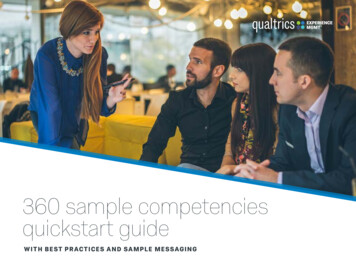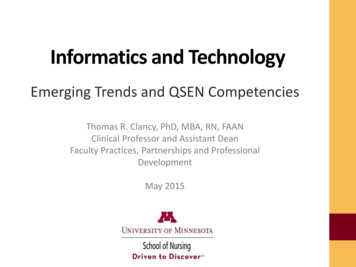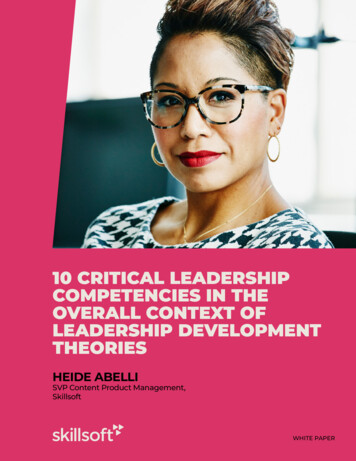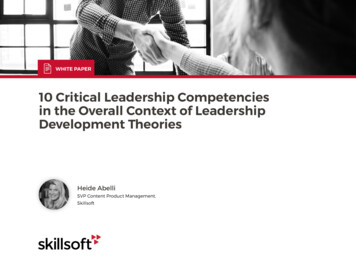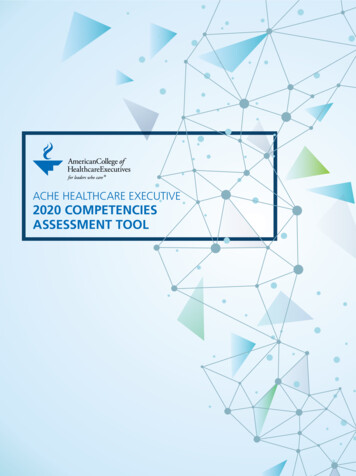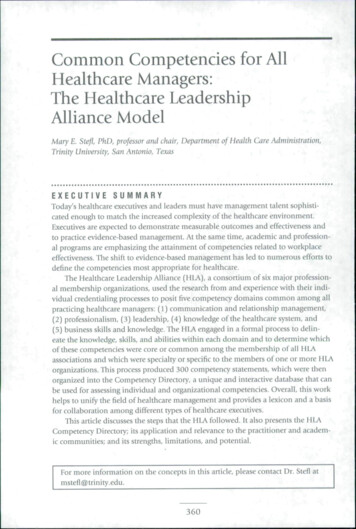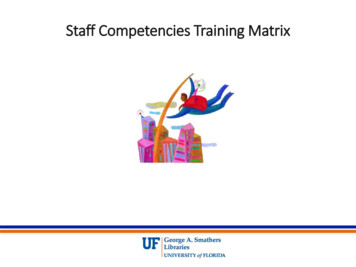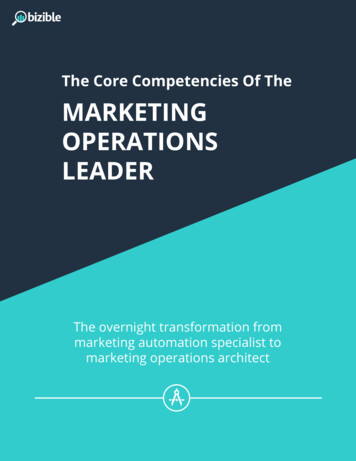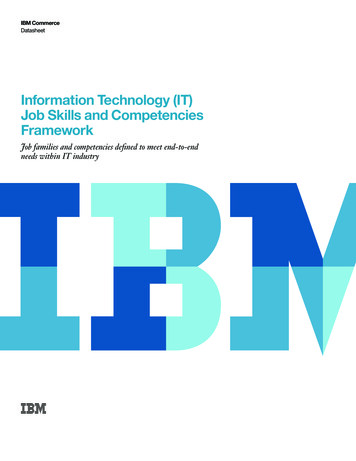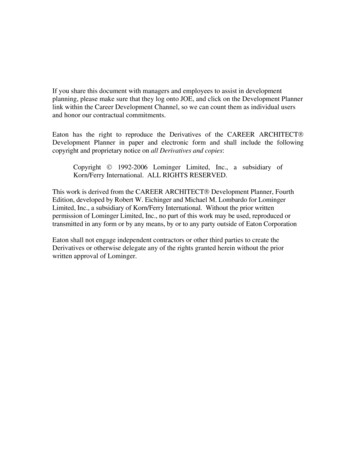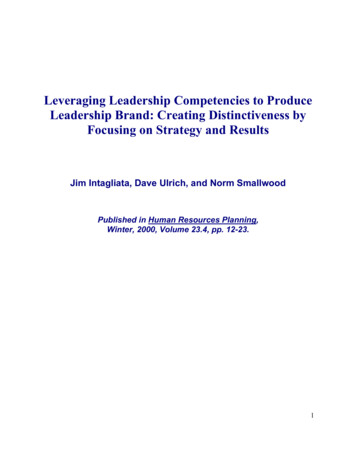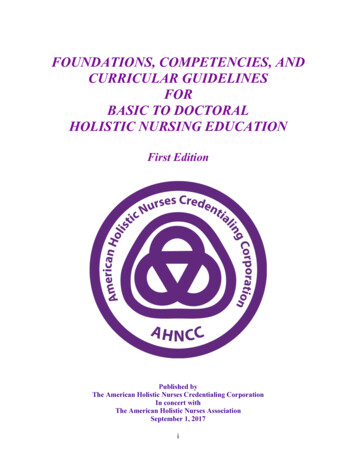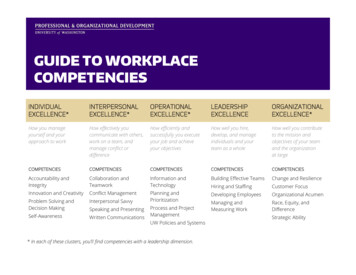
Transcription
GUIDE TO CELLENCEORGANIZATIONALEXCELLENCE*How you manageyourself and yourapproach to workHow effectively youcommunicate with others,work on a team, andmanage conflict ordifferenceHow efficiently andsuccessfully you executeyour job and achieveyour objectivesHow well you hire,develop, and manageindividuals and yourteam as a wholeHow well you contributeto the mission andobjectives of your teamand the organizationat IESCOMPETENCIESAccountability andIntegrityCollaboration andTeamworkInformation andTechnologyBuilding Effective TeamsChange and ResilienceHiring and StaffingCustomer FocusInnovation and CreativityConflict ManagementDeveloping EmployeesOrganizational AcumenProblem Solving andDecision MakingInterpersonal SavvyPlanning andPrioritizationManaging andMeasuring WorkRace, Equity, andDifferenceSelf-AwarenessWritten CommunicationsSpeaking and PresentingProcess and ProjectManagementUW Policies and Systems* In each of these clusters, you’ll find competencies with a leadership dimension.Strategic Ability
POD GUIDE TO WORKPLACECOMPETENCIESINDIVIDUAL EXCELLENCE . 3Accountability and Integrity . 3Innovation and Creativity . 4Problem Solving and Decision Making . 5Self-Awareness . 6INTERPERSONAL EXCELLENCE . 7Collaboration and Teamwork . 7Conflict Management . 9Interpersonal Savvy . 10Speaking and Presenting . 11Written Communications . 12OPERATIONAL EXCELLENCE . 13Information and Technology . 13Planning and Prioritization . 14Process and Project Management . 15UW Policies and Systems . 16LEADERSHIP EXCELLENCE . 17Building Effective Teams . 17Hiring and Staffing . 18Developing Employees . 19Managing and Measuring Work . 20ORGANIZATIONAL EXCELLENCE. 21Change and Resilience . 21Customer Focus . 22Organizational Acumen . 23Race, Equity, and Difference . 24Strategic Ability . 25University of Washington – Professional & Organizational pod/UPDATED MAY 2021
INDIVIDUAL EXCELLENCEI.Accountability and IntegrityA.B.C.D.Accepts responsibility for mistakes.Actively seeks and accepts feedback.Demonstrates an understanding of impact on others.Holds self accountable for delivering on commitments and renegotiates when neededand appropriate.E. Is perceived as a direct, truthful individual, and is widely trusted.Leadership Dimension:F.G.H.I.J.Demonstrates a high level of integrity.Displays managerial courage (confronts others, makes difficult decisions, etc.).Does what she/he says; "walks the talk."Holds others accountable for making and delivering on commitments and renegotiateswhen needed and appropriate.Models the values of the organization.RELATED POD OFFERINGSClasses and webinars Q0850 How to Give and Receive Feedback Q1770 A Practical Approach to Anti-Racism Q1220 Conflict Management Q1221 Conflict Management Q1510 Cultural Proficiency Q0220 Customer Service Excellence Q1650 De-Escalation Skills for the Workplace Q0000 Developing Assertiveness Skills QA002 Exploration of Race in the Workplace: A Guide for Self-Study SLP230 Leadership for a Global Perspective Q0200 Learning to Lead Q1750 The Challenge of Allyship SLP240 The Coach Approach Q0720 Learned Optimism: Understanding Your Explanatory Style Q1690 Respectful Partnerships SLP210 SLP Level 2: Core Strengths — Results Through RelationshipsConsulting services Coaching services UW ARC 360 (360-degree assessment)Training programs SLP Supervisor OrientationUW Human Resources training Violence Prevention and Response Training DIRECTLY SUPPORTS DEVELOPING THIS COMPETENCY. MAY HELP DEVELOP ASPECTS OF THIS COMPETENCY.Competencies adapted from FYI: For Your Improvement by Michael M. Lombardo and Robert W. Eichinger (2009).PAGE3
II.Innovation and CreativityA. Generates new and unique ideas and solutions.B. Easily makes connections among previously unrelated notions.C. Demonstrates innovative and creative thinking processes.D. Seen as original and value-added in brainstorming sessions.Leadership Dimension:E. Effectively adjusts to situations that need rapid resolution.F. Fosters an attitude of continuous improvement.G. Seeks and incorporates feedback from customers/other organizations about theperformance of their unit.H. Seeks out and is open to innovative ways to achieve results.RELATED POD OFFERINGSClasses and webinars Q1730 Applying a Growth Mindset for Exceptional Work SLP250 Human-Centered Design for Innovation & Creative Problem Solving Q1550 Mindfulness and Leadership Q1460 Thinking on Your Feet Q1520 Understand and Influence Your Work Culture Q1660 The Art of Project Management Q1600 Courageous Collaboration Q1170 Process Improvement Tools Q1180 Rapid Process Improvement DIRECTLY SUPPORTS DEVELOPING THIS COMPETENCY. MAY HELP DEVELOP ASPECTS OF THIS COMPETENCY.Competencies adapted from FYI: For Your Improvement by Michael M. Lombardo and Robert W. Eichinger (2009).PAGE4
III.Problem Solving and Decision MakingA. Makes timely and sound decisions that lead to results.B. Looks beyond the obvious to perform honest analysis and see hidden problems.C. Uses rigorous logic and methods to solve difficult problems with effective solutions.Leadership Dimension:D. Considers a broad range of issues or factors in making decisions.E. Effectively balances tasks and people—the need for work to get done and concern forpeople’s needs.F. Pushes decision-making to the lowest-appropriate level.G. Sees the complexities of and relationships among problems or issues.RELATED POD OFFERINGSCertificates Administrative ExcellenceClasses and webinars SLP250 Human-Centered Design for Innovation & Creative Problem Solving Q1640 Systems Wisdom Q1720 Continuous Improvement Through Kaizen Q1620 Creating an Inclusive Workplace Through Emotional Intelligence Q1680 Find Your Focus: Prioritizing Work and Life Q0720 Learned Optimism: Understanding Your Explanatory Style Q1580 Negotiating Effectively Q1630 Peer Coaching Q1170 Process Improvement Tools Q1180 Rapid Process Improvement Q1470 Working SmarterConsulting services Coaching services DIRECTLY SUPPORTS DEVELOPING THIS COMPETENCY. MAY HELP DEVELOP ASPECTS OF THIS COMPETENCY.Competencies adapted from FYI: For Your Improvement by Michael M. Lombardo and Robert W. Eichinger (2009).PAGE5
IV.Self-AwarenessA. Is committed to and actively works to improve self.B. Knows personal strengths, weaknesses, opportunities, and limits.C. Seeks feedback regularly and from multiple sources.D. Gains insights from mistakes.E. Is open to criticism; isn’t defensive.F. Looks forward to balanced performance reviews and career discussions.RELATED POD OFFERINGSClasses and webinars Q1620 Creating an Inclusive Workplace Through Emotional Intelligence Q1650 De-Escalation Skills for the Workplace Q0910 Discovering Your Dependable Strengths Q0110 Emotional Intelligence Q0850 How to Give and Receive Feedback Q0720 Learned Optimism: Understanding Your Explanatory Style Q0060 Turning Negative Emotions Into Positive Outcomes Q0030 Communication Style: Creating Positive Relationships and Results Q0040 Communications Q1220 Conflict Management Q1221 Conflict Management Q0300 Conflict Resolution Skills for Health Care Professionals QA002 Exploration of Race in the Workplace: A Guide for Self-Study Q1200 Exploring Cultural Competence Q1510 Cultural Proficiency Q0220 Customer Service Excellence Q0000 Developing Assertiveness Skills Q1670 The Erosion of Empathy Q0430 Managing Stress Q1740 Managing Up Q1550 Mindfulness and Leadership Q1590 People From Pluto: Effective Communication Strategies Q1690 Respectful Partnerships SLP210 SLP Level 2: Core Strengths — Results Through Relationships SLP240 The Coach Approach Q1222 Style Matters: Kraybill Conflict Style Inventory Q1470 Working SmarterConsulting services Myers-Briggs Type Indicator (assessment and follow-up coaching) UW ARC 360 (360-degree assessment) Coaching services DIRECTLY SUPPORTS DEVELOPING THIS COMPETENCY. MAY HELP DEVELOP ASPECTS OF THIS COMPETENCY.Competencies adapted from FYI: For Your Improvement by Michael M. Lombardo and Robert W. Eichinger (2009).PAGE6
INTERPERSONAL EXCELLENCEV.Collaboration and TeamworkA.B.C.D.Achieves results through collaboration.Establishes common ground and connections with others.Collaborates well with people different from self.Shows an interest in and acknowledges others’ input and skills.Leadership Dimension:E.F.Builds appropriate alliances across organizational lines.Contributes to discussions, actions, and projects in ways that lead to shared responsibility and sharedsuccess.G. Motivates and challenges others to define new opportunities and continuously improve theorganization.H. Shares ownership, visibility, and credit for success.RELATED POD OFFERINGSCertificates Administrative ExcellenceClasses and webinars 40Q0200Q0170Q1740Q1580Building Better TeamsCreating an Inclusive Workplace Through Emotional IntelligenceCourageous CollaborationIncreasing Your InfluencePeople From Pluto: Effective Communication StrategiesPeer CoachingSLP Level 2: Core Strengths — Results Through RelationshipsA Practical Approach to Anti-RacismThe Art of Project ManagementBuilding a Positive Work CultureThe Challenge of AllyshipCommunication Style: Creating Positive Relationships and ResultsCommunicationsContinuous Improvement Through KaizenCultural ProficiencyDeveloping Assertiveness SkillsEmployee Experience AcceleratorHow the U(W) WorksLeadership for a Global PerspectiveLeadership Style Makes a DifferenceLearning to LeadMaking the Move From Peer to SupervisorManaging UpNegotiating Effectively DIRECTLY SUPPORTS DEVELOPING THIS COMPETENCY. MAY HELP DEVELOP ASPECTS OF THIS COMPETENCY.Competencies adapted from FYI: For Your Improvement by Michael M. Lombardo and Robert W. Eichinger (2009).PAGE7
CONTINUEDCollaboration and Teamwork, continued Q0460Q1350Q1690Q1241Q1222Q0331Q0730Project Management EssentialsProject Management for the Non-Project ManagerRespectful PartnershipsSpheres of Power and InfluenceStyle Matters: Kraybill Conflict Style InventoryTraining, Coaching, and Mentoring for SuccessWorking Across GenerationsConsulting serv
COMPETENCIES. Building Effective Teams . Hiring and Staffing . Developing Employees . Managing and Measuring Work . COMPETENCIES. Change and Resilience . Customer Focus . Organizational Acumen . Race, Equity, and Difference . Strategic Ability * In each of these clusters, you’ll find competencies with a leadership dimension.
